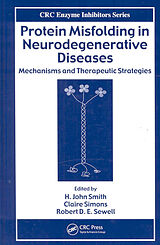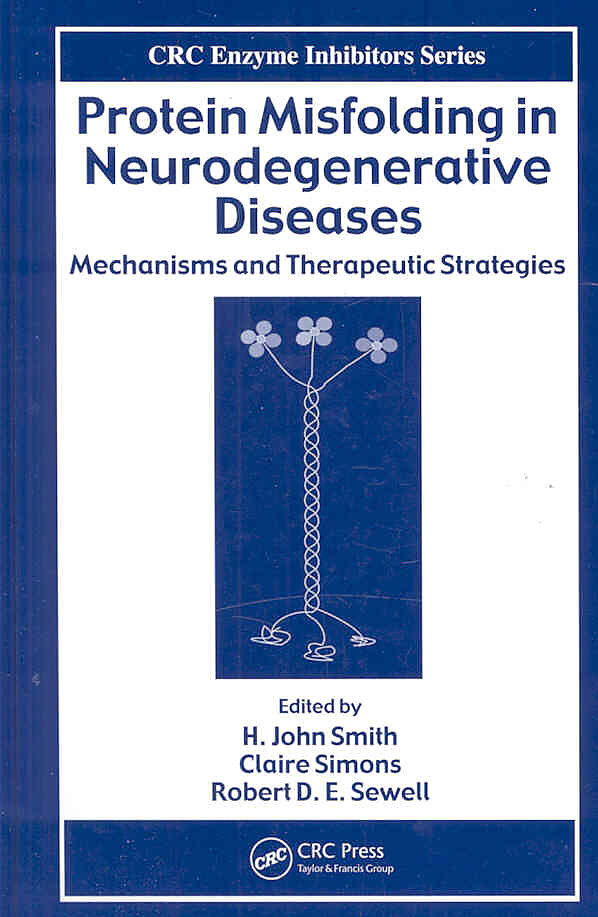Protein Misfolding in Neurodegenerative Diseases
Einband:
Fester Einband
EAN:
9780849373107
Genre:
Medical Books
Autor:
Robert D. E. Sewell
Herausgeber:
CRC Press
Erscheinungsdatum:
03.12.2007
Informationen zum Autor H. John Smith, Claire Simons, Robert D. E. Sewell Klappentext Research focused on protein folding, misfolding, and aggregation is leading to major advances across biochemistry and medicine. The elucidation of a folding code is proving to be of extreme importance in the postgenomic era, where a number of orphan genes have been identified for which no clear function has yet been established. This research is starting to shed light on the molecular and biochemical basis of a number of neurodegenerative diseases of dramatic impact. Protein Misfolding in Neurodegenerative Diseases: Mechanisms and Therapeutic Strategies addresses key issues concerning protein misfolding and aggregation in neurodegenerative diseases. Building on recent developments, including the recognition of protein misfolding as both a marker and a causal agent, the text presents the work of those who are actively pursuing more effective treatments, as well as preventative measures, and a possible cure. These include the use of molecular chaperones to control misfolding and novel pharmaceuticals, as well as the potential role of various inhibitors and NSAIDS. A Comprehensive Multifaceted Examination of the Complex Causal Agents Implicated in Protein Misfolding Divided into five sections, this groundbreaking text provides up-to-date accounts for Alzheimer's, Parkinson's, Huntington's, Amyotrophic Lateral Sclerosis and Transmissible Spongiform Encephalitis. It also explores the highly likelihood that multiple factors, including oxidative stress, play a role in these complex diseases. Zusammenfassung Describes the findings regarding protein misfolding in the context of it being a marker, and perhaps a cause, in neurodegenerative diseases. This book covers the diverse biochemical targets/markers for each disease, the limited success of drug therapies, and the research that could lead to potentially more promising treatments. Inhaltsverzeichnis INTRODUCTION. Protein Folding. ALZHEIMER'S DISEASE. Alzheimer's Disease: Epidemiology, symptoms and clinical pathology. Improving Cholinergic Transmission. Reduction in Plaque Formation. Carbonic Anhydrase Activation. Reduction of Intracellular Neurofibrillary Tangles from Tau Protein. Oxidative Stress Reduction. Enhancement of Brain Retinoic Acid Levels. Sulfatase Inhibitors and Cognitive Enchancement. PARKINSON'S DISEASE. Epidemiology, Symptoms and Clinical Pathology. Restoring Dopamine Levels. Anticholinergics. RARER NEURODEGENERATIVE DISEASES. Huntington's Disease. Amyotrophic Lateral Sclerosis (Motor Neurone Disease). Transmissible Spongiform Encephalopathies (TSEs) Bovine Spongiform Encephalopathy (BSE) Creutzfeldt-Jacob Disease (CJD, vCJD) Scrapie. Overview Common Role of Protein Misfolding in Neurodegenerative Diseases. ...
Autorentext
H. John Smith, Claire Simons, Robert D. E. Sewell
Klappentext
Research focused on protein folding, misfolding, and aggregation is leading to major advances across biochemistry and medicine. The elucidation of a folding code is proving to be of extreme importance in the postgenomic era, where a number of orphan genes have been identified for which no clear function has yet been established. This research is starting to shed light on the molecular and biochemical basis of a number of neurodegenerative diseases of dramatic impact. Protein Misfolding in Neurodegenerative Diseases: Mechanisms and Therapeutic Strategies addresses key issues concerning protein misfolding and aggregation in neurodegenerative diseases. Building on recent developments, including the recognition of protein misfolding as both a marker and a causal agent, the text presents the work of those who are actively pursuing more effective treatments, as well as preventative measures, and a possible cure. These include the use of molecular chaperones to control misfolding and novel pharmaceuticals, as well as the potential role of various inhibitors and NSAIDS. A Comprehensive Multifaceted Examination of the Complex Causal Agents Implicated in Protein Misfolding Divided into five sections, this groundbreaking text provides up-to-date accounts for Alzheimer's, Parkinson's, Huntington's, Amyotrophic Lateral Sclerosis and Transmissible Spongiform Encephalitis. It also explores the highly likelihood that multiple factors, including oxidative stress, play a role in these complex diseases.
Zusammenfassung
Describes the findings regarding protein misfolding in the context of it being a marker, and perhaps a cause, in neurodegenerative diseases. This book covers the diverse biochemical targets/markers for each disease, the limited success of drug therapies, and the research that could lead to potentially more promising treatments.
Inhalt
INTRODUCTION. Protein Folding. ALZHEIMER'S DISEASE. Alzheimer's Disease: Epidemiology, symptoms and clinical pathology. Improving Cholinergic Transmission. Reduction in Plaque Formation. Carbonic Anhydrase Activation. Reduction of Intracellular Neurofibrillary Tangles from Tau Protein. Oxidative Stress Reduction. Enhancement of Brain Retinoic Acid Levels. Sulfatase Inhibitors and Cognitive Enchancement. PARKINSON'S DISEASE. Epidemiology, Symptoms and Clinical Pathology. Restoring Dopamine Levels. Anticholinergics. RARER NEURODEGENERATIVE DISEASES. Huntington's Disease. Amyotrophic Lateral Sclerosis (Motor Neurone Disease). Transmissible Spongiform Encephalopathies (TSEs) Bovine Spongiform Encephalopathy (BSE) Creutzfeldt-Jacob Disease (CJD, vCJD) Scrapie. Overview Common Role of Protein Misfolding in Neurodegenerative Diseases.

Leider konnten wir für diesen Artikel keine Preise ermitteln ...
billigbuch.ch sucht jetzt für Sie die besten Angebote ...
Die aktuellen Verkaufspreise von 6 Onlineshops werden in Realtime abgefragt.
Sie können das gewünschte Produkt anschliessend direkt beim Anbieter Ihrer Wahl bestellen.
Loading...
Die aktuellen Verkaufspreise von 6 Onlineshops werden in Realtime abgefragt.
Sie können das gewünschte Produkt anschliessend direkt beim Anbieter Ihrer Wahl bestellen.
| # | Onlineshop | Preis CHF | Versand CHF | Total CHF | ||
|---|---|---|---|---|---|---|
| 1 | Seller | 0.00 | 0.00 | 0.00 |
